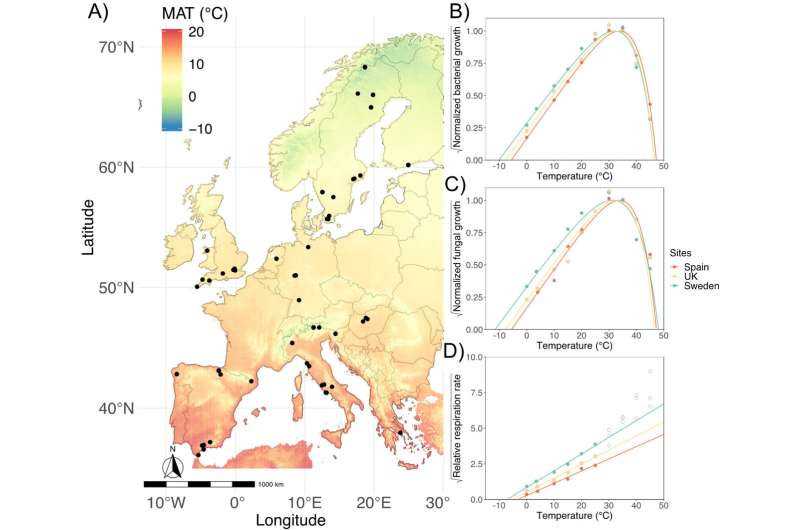This article has been reviewed according to Science X's editorial process and policies. Editors have highlighted the following attributes while ensuring the content's credibility:
fact-checked
peer-reviewed publication
trusted source
proofread
Microorganisms' climate adaptation can slow down global warming

A new study from Lund University in Sweden shows that the ability of microorganisms to adapt to climate warming will slow down global warming by storing carbon in soil.
In the study, researchers collected soil samples from across Europe in a wide range of temperatures, from minus 3.1°C to 18.3°C. The samples revealed that microorganisms in soils—such as bacteria and fungi—are strongly adapted to their local climate when it comes to growth and respiration. However, the researchers surprisingly demonstrated that microorganisms can adapt to temperature changes. The organisms can even benefit from these changes.
"Despite decades of scientific pondering, researchers have not been able to determine whether microorganisms can adapt to warming, and if they do. We can now confirm that this is the case, and that the organisms can actually mitigate climate warming," says Carla Cruz Paredes, a biology researcher at Lund University.
The new study, published in the journal Applied and Environmental Microbiology, also reveals that groups of microorganisms react differently to warming. Bacteria and fungi differ in their sensitivity to temperature changes, with bacteria being more sensitive than fungi. Moreover, microbial growth is more sensitive to temperature changes than respiration. These differences in temperature sensitivity have important implications for predictions of future carbon losses and storage, as well as how the soil is affected by climate warming.
"The outcome of these varying sensitivities to growth and respiration at different temperatures, and between bacteria and fungi, will impact the carbon balance between the soil and the atmosphere, and thus the soil's feedback on climate warming," says Carla Cruz Paredes.
The study highlights the importance of accurately representing microbial responses to climate warming in models of soil carbon content. The research also shows that ecological responses from the Earth's microorganisms will play a key role in regulating the planet's climate.
"Climate warming is one of the biggest threats to our environment. To mitigate global warming, it is necessary to enhance the soil's ability to store or sequester carbon and reduce carbon emissions into the atmosphere. This study is a step forward in providing better predictions for the assessments of the UN's climate panel," says Carla Cruz Paredes.
More information: Carla Cruz-Paredes et al, Variation in Temperature Dependences across Europe Reveals the Climate Sensitivity of Soil Microbial Decomposers, Applied and Environmental Microbiology (2023). DOI: 10.1128/aem.02090-22
Journal information: Applied and Environmental Microbiology
Provided by Lund University

















